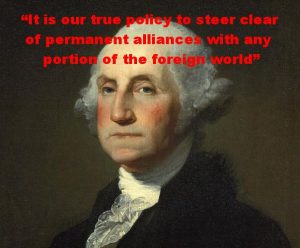Much of the criticism I hear about my Libertarian politics concerns the idea of non-interference and often it is because there is confusion between that concept and isolationism.
What Ron Paul and other Libertarians like myself are talking about is non-interference. This dates back to George Washington in his Farewell Address when he suggests avoiding foreign entanglements. The United States long avoided such alliances.
What does Non-Interference Mean
It’s a broad definition and it means different things to different people. Largely non-interference means not having alliances with foreign nations. Not interfering in their internal politics, and not going to war on foreign soil. It is important to consider that times have changed as far as the ability of a nation to extend their force. When Washington was president the United States was physically isolated from Europe and its bickering. It was difficult for European powers to extend their influence into the American region. This has changed with the advent of intercontinental ballistic missiles and connected economies.
What non-interference does not mean, in my opinion, is that we should stay completely out of the affairs of the world. This is isolationism and in the modern world is a dangerous policy. Newt Gingrich is correct when he talks about the dangers of an air burst nuclear weapon and the modern communication grid. We cannot isolate ourselves from the world because the world has the ability to touch us both militarily and economically. We must engage the powers of the world but that doesn’t mean we need to police them or dictate to them.
History
If we look back on American history I think our worst moments came from meddling in the affairs of foreign nation, in regime change policies, in propping up totalitarian regimes that supported us, at least in words if not deeds.
There are Libertarians who support a stricter version of non-interference that borders on isolationism. They might well quibble with some of my characterizations here. I don’t think the United States should disengage completely from countries like Pakistan. Such policies in regard to Cuba are a mistake. I think we should always attempt to talk with other nations, supply them with help if they ask for it, but we should minimize our attempts to influence their policy decisions.
It is in our interest if Pakistan helps hunt down people trying to hurt the United States but I don’t think we should be trying to purchase that cooperation with what amounts to bribery. If Pakistan wants to cooperate we should engage with them but cautiously. George Washington warned us to be wary not only of our international enemies but of our allies as well and with good reason. They are interested, rightly so, in what is best for their nation.
Conclusions
The waters of international politics are rife with danger and caution is a good ally. Engage but don’t interfere. A fine line.
Tom Liberman

The popular media uses that “isolationist” retoric to harm Ron Paul and make his look crazy. The same way accuse people who are anti-war as non-American or not supporting the troops. I can’t tell you how many people have told me “well, Ron Paul is an isolationist!” Why? Because he’s against war? If anything he’s the least isolationist as he wants to have open communication and free trade with ALL countries!